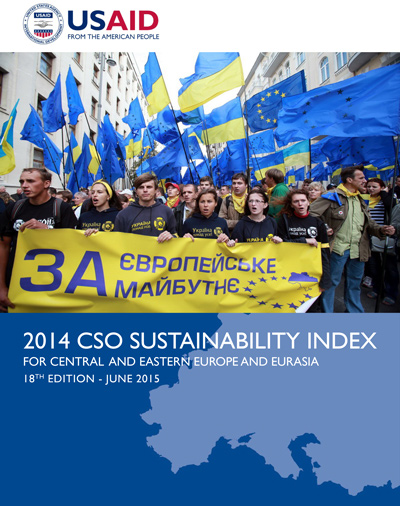- What We Do
- Agriculture and Food Security
- Democracy, Human Rights and Governance
- Democracy, Human Rights and Governance Strategy
- Supporting Free and Fair Elections
- Supporting Vibrant Civil Society & Independent Media
- Protecting Human Rights
- Promoting Accountability & Transparency
- Importance of Democracy, Human Rights, & Governance to Development
- Countering Trafficking in Persons
- Economic Growth and Trade
- Education
- Ending Extreme Poverty
- Environment and Global Climate Change
- Gender Equality and Women's Empowerment
- Global Health
- Water and Sanitation
- Working in Crises and Conflict
- U.S. Global Development Lab
CSO Sector Development In 2014
The Civil Society Organization (CSO) sectors Central and Eastern Europe and Eurasia continue to be highly diverse in 2014. On one end of the spectrum is Estonia, which records the highest level of sustainability of any country measured in all the regions covered by the CSO Sustainability Index. With a population of just 1.3 million, the more than 30,000 CSOs in the country continue to benefit from a supportive legal environment, infrastructure, and public image and are strong advocates and service providers. On the other end of the spectrum are countries where CSOs operate in highly restrictive legal environments, with limited access to funding and virtually no space for independent advocacy. This division occurs across countries—in terms of vastly different legal and operating environments—and within countries—where different CSOs are subject to different restrictions and benefits. CSOs also face several barriers to improving their public image and financial viability.
Background
The Civil Society Organization Sustainability Index (CSOSI) has been used since 1997 to assess the sustainability of the CSO sector. The Index has expanded considerably since its inception – it went from covering 18 countries in the Europe and Eurasia Region, to covering over 60 countries in different regions around the world. By using standard indicators and collecting data each year, the CSOSI enables users to track developments and identify trends in the CSO sector over time while allowing for cross-country and cross-region comparison. It is used by CSO advocates, development partners, and academics to assess international and regional trends in the civil society sector and to identify common obstacles impeding the sector's sustainability, such as the legal environment, organizational capacity, and financial viability.
Approach
The Index measures the sustainability of each country's CSO sector based on the CSOSI's seven dimensions: legal environment, organizational capacity, financial viability, advocacy, service provision, infrastructure, and public image. The CSOSI's local implementing partners in each country lead the process of organizing and convening a diverse and representative panel of CSO experts. Country panels discuss the seven dimensions for the year being assessed, and reach consensus on the scores corresponding to each dimension. With the information provided by the expert panel along with desk research, the CSO implementing partner then develops a narrative report.








Comment
Make a general inquiry or suggest an improvement.